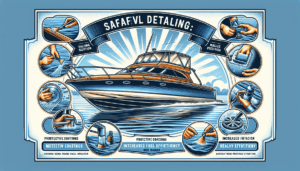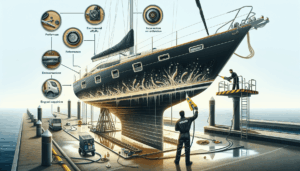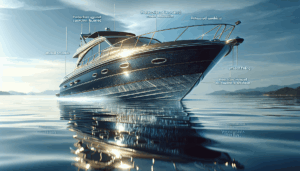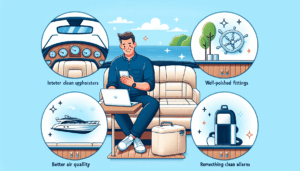If you’re a boat owner, ensuring the safety of yourself and your passengers is likely a top priority. That’s why boat detailing is such a crucial aspect of maintenance. With the expertise of Ace Mobile Detailing, a fully licensed and insured professional company, you can experience the top 4 benefits of boat detailing for enhancing onboard safety. From improving visibility to preventing accidents, our team uses the best products on the market to make sure you can confidently navigate the waters. So, let us help you feel truly fortunate as you enjoy your freshly detailed boat, knowing that your safety is our number one concern.

Protecting the Hull
Preventing damage from UV rays
One important aspect of maintaining your boat and ensuring onboard safety is protecting the hull from damage caused by UV rays. UV rays from the sun can lead to fading and degradation of the boat’s exterior, making it prone to cracks and other structural damage. To prevent this, it is crucial to regularly apply a protective coating or wax to the hull. This coating forms a barrier between the boat’s surface and the harmful UV rays, preserving the integrity of the hull and extending its lifespan.
Protecting against corrosion
Corrosion is a common issue faced by boat owners, as exposure to water and moisture can cause metal components to rust and weaken over time. To protect your boat against corrosion and maintain onboard safety, it is essential to implement regular cleaning and maintenance practices. This may involve inspecting and repairing any signs of corrosion, applying anti-corrosion treatments, and ensuring proper drainage and ventilation to prevent water buildup in vulnerable areas of the boat.
Improving fuel efficiency
In addition to protecting the hull from external damage, boat detailing also plays a significant role in improving fuel efficiency. When the hull of a boat becomes dirty or covered in algae and other marine organisms, it creates friction in the water, making the boat work harder to maintain speed and maneuverability. By regularly cleaning and detailing the boat’s hull, you can reduce drag and improve fuel efficiency, allowing you to get the most out of your fuel and enhancing onboard safety by ensuring optimal performance.
Maintaining Clear Visibility
Cleaning and polishing windows and windshields
maintaining clear visibility is crucial for safe navigation on the water. Dirty or foggy windows and windshields can significantly impair your ability to see obstacles, other vessels, or navigational markers. To enhance onboard safety, it is essential to regularly clean and polish these surfaces using appropriate cleaning products and techniques. This helps to remove dirt, smudges, and water spots, ensuring maximum visibility and reducing the risk of accidents or collisions.
Removing dirt and grime from mirrors and lights
In addition to windows and windshields, it is equally important to keep mirrors and lights on your boat clean and free from dirt and grime. Mirrors allow you to have a clear view of your surroundings and assist in maneuvering the boat safely. Lights, on the other hand, play a vital role in maintaining visibility during low-light conditions or at night. By regularly cleaning and maintaining these essential components, you can ensure clear visibility and enhance safety for both yourself and other boaters.
Enhancing visibility during navigation
Besides cleaning and maintaining individual components, it is crucial to consider the overall visibility of your boat during navigation. This includes removing any obstructive objects or debris from your boat’s deck, ensuring that navigational lights and signals are in good working condition, and maintaining proper positioning and alignment of mirrors and windows. By enhancing overall visibility, you can minimize the risk of accidents and collisions, making your boating experience safer and more enjoyable.
Ensuring Proper Functioning of Equipment
Cleaning and lubricating mechanical systems
To ensure the proper functioning of your boat’s equipment and promote onboard safety, regular cleaning and lubrication of mechanical systems are essential. Dirt, saltwater, and other debris can accumulate in various mechanical components, causing them to become less efficient or even fail. By implementing a routine maintenance schedule that includes cleaning and lubrication of these systems, you can prevent malfunctions, extend the lifespan of your equipment, and ensure a safe and reliable boating experience.
Inspecting and maintaining electrical components
Electrical components play a crucial role in the operation of your boat’s various systems, including navigation lights, communication devices, and safety equipment. Regular inspection and maintenance of these components are vital to identify any signs of wear, damage, or potential hazards. This may involve checking wiring connections, testing batteries, and replacing faulty or outdated electrical equipment. By taking proactive measures to ensure the proper functioning of your boat’s electrical components, you can minimize the risk of electrical malfunctions, fire, or other accidents.
Preventing malfunctions and accidents
By maintaining and inspecting your boat’s equipment regularly, you can proactively identify and address any potential malfunctions or hazards before they become significant safety concerns. This includes checking and replacing worn or damaged parts, verifying the functionality of safety equipment such as life jackets and fire extinguishers, and ensuring the proper installation and operation of navigation devices. By prioritizing the maintenance and proper functioning of equipment, you can reduce the risk of accidents and ensure a safer boating experience for you, your passengers, and other boaters.
Reducing the Risk of Slips and Falls
Eliminating algae and mildew buildup on decks
One of the top priorities for boat detailing in terms of onboard safety is eliminating algae and mildew buildup on decks. Algae and mildew can create slippery surfaces that pose a significant risk of slips and falls for both passengers and crew. Regular cleaning and treatment of deck surfaces with appropriate cleaning products can help prevent the growth of algae and mildew. Additionally, implementing proper drainage systems and ensuring good ventilation can further reduce the risk of slippery surfaces, enhancing safety and minimizing the chances of accidents.
Treating and preventing slippery surfaces
In addition to algae and mildew buildup, there are other factors that can contribute to slippery surfaces on a boat. These include spilled liquids, oil residue, or even water splashes from the sea. To mitigate the risk of slips and falls, it is crucial to promptly clean up any spills, use nonslip mats or coatings on high traffic areas, and regularly inspect and maintain flooring materials for any signs of wear. By treating and preventing slippery surfaces, you create a safer environment for both passengers and crew, reducing the likelihood of accidents and injuries.
Promoting a safe environment for passengers and crew
Creating a safe environment on your boat is not only about addressing specific hazards but also about promoting a culture of safety for both passengers and crew. This can be achieved through proper training on safety procedures, including emergency protocols and the proper use of safety equipment. Regular safety inspections and checks, as well as maintaining clear signage and instructions, further contribute to ensuring onboard safety. By fostering a safe environment and maintaining a proactive approach to safety, you can instill confidence in your passengers and crew, creating a pleasant and secure boating experience for everyone involved.
In conclusion, boat detailing plays a crucial role in enhancing onboard safety. By protecting the hull, maintaining clear visibility, ensuring proper functioning of equipment, and reducing the risk of slips and falls, you can create a safer and more enjoyable boating experience. Regular cleaning, maintenance, and inspection are key to preventing damage, promoting visibility, minimizing malfunctions, and eliminating hazards. By prioritizing onboard safety through boat detailing, you can protect yourself, your passengers, and your boat, while maximizing the enjoyment of your time on the water.





